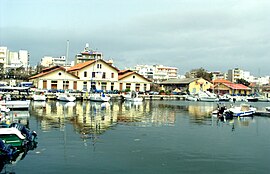Alexandroupoli
|
Alexandroupoli Αλεξανδρούπολη |
|
|---|---|

Customs building at the port
|
|
| Coordinates: 40°51′N 25°52′E / 40.850°N 25.867°ECoordinates: 40°51′N 25°52′E / 40.850°N 25.867°E | |
| Country | Greece |
| Administrative region | East Macedonia and Thrace |
| Regional unit | Evros |
| Area | |
| • Municipality | 1,217.0 km2 (469.9 sq mi) |
| • Municipal unit | 642.2 km2 (248.0 sq mi) |
| Highest elevation | 11 m (36 ft) |
| Lowest elevation | 0 m (0 ft) |
| Population (2011) | |
| • Municipality | 72,959 |
| • Municipality density | 60/km2 (160/sq mi) |
| • Municipal unit | 61,702 |
| • Municipal unit density | 96/km2 (250/sq mi) |
| Community | |
| • Population | 57.812 (2,011) (2011) |
| Time zone | EET (UTC+2) |
| • Summer (DST) | EEST (UTC+3) |
| Postal code | 681 00 |
| Area code(s) | 25510 |
| Vehicle registration | ΕΒ |
| Website | www.alexpolis.gr |
Alexandroupoli (Greek: Αλεξανδρούπολη, [aleksanˈðrupoli]) is a city in Greece and the capital of the Evros regional unit in East Macedonia and Thrace. It is an important port and commercial center of northeastern Greece.
Alexandroupoli is one of the newest cities in Greece, as it was only a fishing village until the late 19th century. However, the modern city is located at the site of ancient Sale (Greek: Σάλη), a Greek city of the classical era founded by colonists from the island of Samothrace, mentioned by Herodotus.
Alexandroupoli benefits from its position at the centre of land and sea routes connecting Greece with Turkey. Landmarks in Alexandroupoli include the city's lighthouse in the port, the archaeological sites of the Mesimvria Zone and Maroneia stretching out to the small port of Agios Charalambos, the city's waterfront (the centre of commercial activity), and the nearby Evros Delta.
The modern city was founded in the middle of the 19th century (when what is now northeastern Greece was still under the rule of the Ottoman Empire) by fishermen from the villages of Makri and Maroneia and it became known as Dedeagach (Greek: Δεδεαγάτς, Turkish: Dedeağaç, Bulgarian: Дедеагач). According to the legend, the name was based on a wise old Turkish man or dede who spent much of his time in the shade of a local tree (in Turkish ağaç) and was eventually buried beside it. In 1920, the King of Greece, Alexander I, visited the city, and the local authorities decided to rename the city Alexandroupoli ("city of Alexander"), in the Greek King's honour. The request was duly approved by the central Greek government, and Alexandroupoli has been the city's name ever since.
...
Wikipedia


